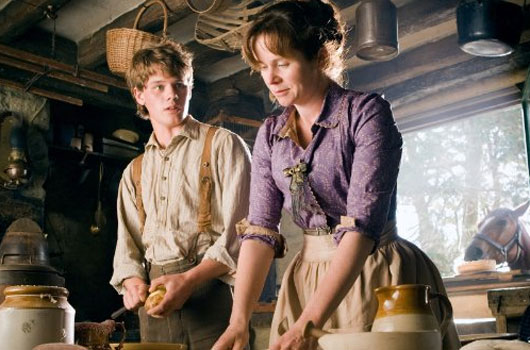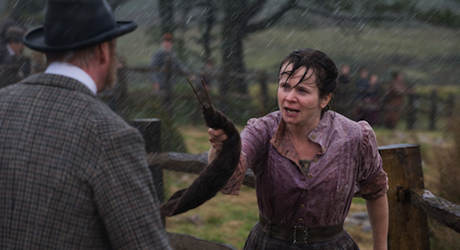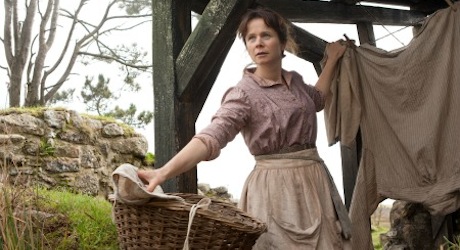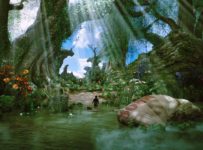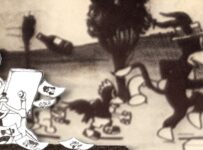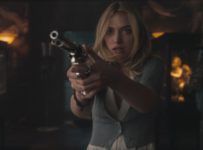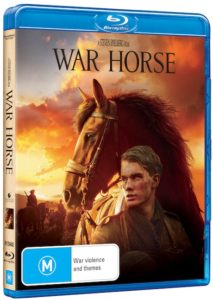 To celebrate the DVD and Blu-ray release of DreamWorks’ War Horse, Disney has sent over some wonderful Q & A content with the cast and filmmakers. The first of these is from star Emily Watson.
To celebrate the DVD and Blu-ray release of DreamWorks’ War Horse, Disney has sent over some wonderful Q & A content with the cast and filmmakers. The first of these is from star Emily Watson.
Emily Watson admits that she watched the London stage production of War Horse through a veil of tears. “I’d seen it when I was eight months pregnant,” she recalls. “And I said ‘I’ve got to get to the theatre before the baby is born because after the birth I don’t know when I’ll get to go again. What shall we go and see?’
“And we decided on War Horse and of course after about ten seconds I just went to pieces and was sobbing away.”
Q: What did you think the first time you saw the finished film?
A: I love it. It’s a big, brassy, bold piece of Hollywood and I mean that as a compliment. I think when you see the film it makes you think of all those words like ‘trust’ and ‘love’ and ‘hope’ and ‘friendship’ and it’s redemptive and it’s a miraculous and it has an uplifting, happy ending which is wonderful and that’s absolutely what you want. But, at the same time, I think Steven has made a very powerful anti-war film. And I think that is great and especially for the younger generation. A lot of kids are growing up playing war games on their computers and they think it’s a game and this film shows very powerfully that it’s not a game and it’s not cool. There was a whole generation wiped out by the First World War and this is what it looks like. It’s a very powerful piece of filmmaking.
Q: You’ve worked with so many great directors covering every spectrum of film, from Lars Von Trier to Paul Thomas Anderson, Robert Altman to Steven Spielberg…
A: Yes, I feel very lucky. And it was a really great thing to get the call from Steven Spielberg. I actually met Steven a long time ago in Hollywood at an (Oscar) nominee’s lunch. Hilary and Jackie was out the same year as Private Ryan and it was one of those things where nominees have a get together. And he came across the room, looked me in the eye and shook my hand and said ‘well done, that was great..’ And I was completely overwhelmed. And then ten years later I got a phone call saying that Steven wanted to meet me and I went to Claridges Hotel in London and he offered me the job.
Q: Did you know what the project was before you met him?
A: Yes, I knew it was for War Horse and I’d seen the play and I said ‘I presume it’s for the (role of the) Mum?’ And they said ‘yes..’
Q: When had you seen the play?
A: I’d seen it when I was eight months pregnant and I said ‘I’ve got to get to the theatre before the baby is born because after the birth I don’t know when I’ll get to go again. What shall we go and see?’ And we decided on War Horse and of course after about ten seconds I just went to pieces and was sobbing away. I did sit through it and I remember I went to a matinee and it was full of a lot of older people who were really quite shaken by it. You know, they were an older generation and for them the First World War wasn’t within living memory but certainly it would have been for their parents and so it was very meaningful to them.
Q: At those early meeting with Steven did you discuss his approach for adapting the playonto the screen?
A: We had a chat about the play and he obviously loved it, as did I. He said ‘I’d love you to do this..’ and I came out of the meeting walking on air, it was a very thrilling day. And obviously, I was very, very excited at the prospect of working with Steven – what actor wouldn’t be? I love his films. And I was intrigued, too, because I knew that he would tell this story in a very powerful way. And he has.
Q: The actors who go to war in the film, like Tom Hiddleston and Benedict Cumberbatch, obviously had a lot of preparation for that big cavalry charge…
A: That’s amazing. I love the sequence because it’s brilliantly conceived and so dramatic.
Q: For you, does it compare with the famous battle scenes in Saving Private Ryan?
A: Yes, it does. And you know when you are watching it that these poor men are riding to their deaths and it’s so moving. And it’s so brilliant to have a sequence like that that portrays such a turning point in history – it’s brilliant, really brilliant.
Q: But what was your preparation? Did you meet up with Peter and Jeremy to discuss a shared approach?
A: I met with Jeremy before hand and I think that was when Jeremy was still going though the casting process and they wanted us to get together to see whether it would work as mother and son. Although, by that time, I think Steven was pretty sure that he wanted Jeremy from quite early on but he just wanted to cover the bases. As far as my preparation goes, it was very interesting because the writing was so well formed and the language, the vernacular, was brilliant because it was so evocative of the place. It was about being in the place with the farm tools and things like that. There’s a scene, which actually didn’t make it into the final cut of the movie which is where I’m making bread. I’d said to Steven, ‘I want to be doing things..’ Because I think a woman in that position, a farmer’s wife who is really running the farm, she is working all of the time, there’s not a lot of sitting around and talking.
Q: So you found the character quite easily?
A: Playing that role was like putting on a really well fitting coat. In a way it’s an archetype because Rose is the Earth Mother, she is the Penelope in The Odyssey and she is the heart to which you return at the end of the journey.
Q: She is a very strong, stoic character. Did you like playing her?
A: I loved playing her. And I loved the relationship with Ted, which is clearly complicated but lovely. They are really well drawn characters.
Q: Did you feel that your characters were almost playing a story within a story?
A: Yes, in a way. There’s a scene where my character Rose tells her son about his father’s involvement in the Boer War and how it has hurt him and changed him. And that was actually Steven’s idea, the Boer War and the pennant that she gives Albert as a sort of cinematic physical emblem that goes through the film. And I think that works beautifully well.
Q: Am I right in thinking that you hadn’t worked with Peter Mullan before? Did you know him?
A: Peter is lovely. I had met him socially a while back. But I hadn’t worked with either Peter or David (Thewlis) but it felt like I knew them both really well because I felt we were all from a similar stable in a way. And it was quite interesting on the first day because Steven talks to you during a take.
Q: Isn’t that distracting?
A: No, it’s not distracting and actually it’s really great but you have to get used to it. I could see Peter was slightly taken aback at first because his universe is Ken Loach where performance is utterly sacrosanct and you don’t disturb it, it’s a really sacred thing, you are in the world of truth of it. But on War Horse you would be in the middle of a take and Steven would talk to you and it’s like he is planting little seeds in your ear and they start to flower. If you accept it, it’s great and a really creative thing.
Q: What sort of things would he say to you?
A: Tom told me about something that Steven said to him before the cavalry scene, which I thought, was a beautiful piece of direction. There is a close up of Tom when he is riding towards the enemy lines and he realizes the machine guns are there and there’s a silent slow motion close up on his face and at that point he knows that he is riding into his death and Steven said ‘I don’t want to see fear, anger, surprise, I don’t want to see any of those emotions.’ He said to Tom ‘how old are you?’ 29. ‘OK, start at 29 and end up at nine. I want to see the man becoming the boy..’ What a brilliant piece of direction that is. And in amongst all the technical things that Steven was dealing with for a sequence like that, which must have been extraordinary, to have that level of emotional awareness kind of sums him up as a director. Extraordinary.
Q: Can you remember the first Steven Spielberg movie you were aware of?
A: Probably Jaws although I don’t think I was allowed to watch it but I was aware that everyone was talking about it and I knew that incredible music that was in it, too. I think E.T. was the first one that I actually saw, which must have been in the early eighties (1982). I saw that in the cinema and I absolutely loved it. I just cried and thought it was wonderful. I actually saw it twice and thought it was just magical.
Q: And over the years you would have watched all of his films?
A: Oh yes. I remember when Schindler’s List came out and people were saying ‘Steven Spielberg is making a film about the holocaust?’ Everyone was kind of sniping about it and then they saw it. And what unbelievable commitment and passion it took to make that extraordinary film. I also loved all the Indiana Jones films, too. And Saving Private Ryan was extraordinary. I think he has created his own cinematic language with war films and our movie, War Horse, is another wonderful example of that. When Joey is caught in the barbed wire in no man’s land it is just a very, very powerful sequence – what a brilliant scene. I love that scene when the English boy meets the German boy and they both cut Joey free.
Q: The English countryside looks very beautiful in the film. Where did you film your section?
A: Most of my scenes were on Dartmoor. I loved it. I actually took my family back there on holiday last summer and the kids loved it. It was wild and wonderful and they were outdoors and wading in streams and climbing up trees. I’ve got a girl and a boy, six and three.
Q: Are they old enough to see the film?
A: No. I’ve showed them the first 20 minutes but they will have to wait until they are older to see the rest. It was like ‘Mummy, what are you doing? Why are you so cross? Why Mummy so cross?’ They saw me on a TV show the other morning and it was ‘Mummy, what have they done to your eyes?’ And I said ‘don’t worry it’s just make-up…’(laughs). They don’t usually see me wearing make up.
Q: So they’re not really aware of what you do?
A: Juliet is, she’s six and she sees the poster on television. But I try and keep a little bit of distance from it.
Q: Do you take the children with you when you’re filming?
A: Not on this one. I bring them when I can but it’s much harder now that my daughter is in school. Up until then I had taken them all over the world – my daughter has been to New Zealand and Australia. And just in September I was doing a film in Mexico and they came out for that.

